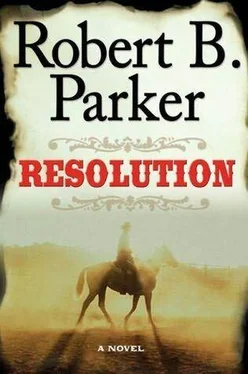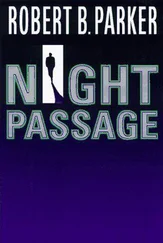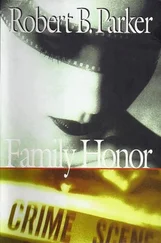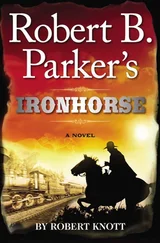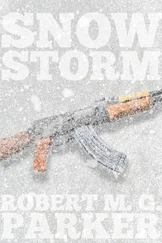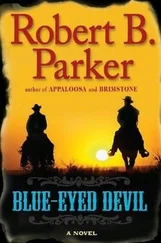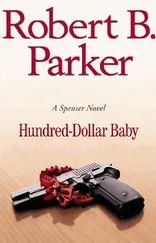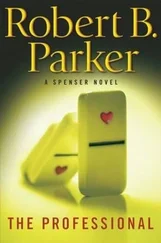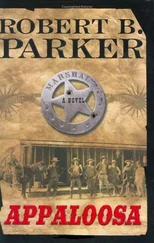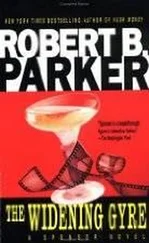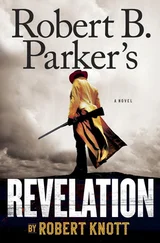“Uh-huh.”
“Hard for a lot of them to come back,” I said, “they get burned out.”
“Harder to come back from getting killed,” Virgil said.
“And it’s worth remembering that unless the Shoshones split up, there’s twenty of them and two of us, at any given time.”
“Shoshones won’t split up,” Virgil said.
“No,” I said.
“And if they get past us and into the town and we’re not there, and Cato and Rose aren’t there, it’ll be a bloodbath.”
“You don’t think Wolfson can rally the troops?”
“Redmond, either,” Virgil said. “Stark maybe, but… he’s not a gunman.”
“And Wolfson and Redmond would be fighting so hard to be in charge that they’d get in his way even if he was,” I said.
Virgil held his horse suddenly. I stopped with him. Virgil listened hard. I hadn’t heard anything, and I still didn’t. After a little bit, Virgil nodded to himself and moved his horse forward again. I went with him.
“Hear something?” I said.
“Nothing that matters,” Virgil said.
We rode on.
“How are things going with you and Mrs. Redmond?” I said.
“Her children are with her,” Virgil said.
“And her husband’s downstairs,” I said.
“That’s right.”
“So things ain’t going at all,” I said.
“That’s right.”
“Sorry to hear that,” I said.
“Things change,” Virgil said.
“Ever think about Allie?” I said.
“Yes.”
I couldn’t think of anything to say about that, so I moved to a different subject.
“Funny thing about Wolfson and Redmond,” I said. “First I thought they just wanted to get ahead in their own way.”
“Probably do,” Virgil said.
“Redmond’s stuck,” I said. “But Wolfson ain’t. He got ahead. He runs the damn town, and he still ain’t happy.”
“He don’t run the town,” Virgil said.
“Who does?”
“We do,” Virgil said.
The Shoshones came in, south of town, about twelve hours ahead of the Army and set fire to the settlements. The smoke hovered over the town, and one of the lookouts fired off a warning shot, claiming Indians were upon us. Everyone with a weapon grabbed it and rushed to find a place to shoot from.
“They ain’t much of a threat to the Shoshones,” Frank Rose said. “But they’re likely to inflict considerable casualties on each other.”
“Guess we better take a look,” Virgil said.
“If the farmers don’t shoot at us,” Rose said.
“If they do, they’ll probably miss,” I said.
There was no sign of anyone in the area where the lookout had seen the hostiles. On horseback we slowly began to circle the town. The smoke from the burning settlements was plain enough, and the smell of it was strong. At the top of a small rise between the town and the settlements we saw two bucks. One had what looked like an old Army-issue Sharps. The other wore a Cavalry campaign hat and carried a button-flap holster that had probably been taken from a soldier someplace. We stopped. The Indians stopped. We looked at one another.
“There’s more of us than them,” Rose said.
“That we can see,” Virgil said.
“True,” Rose said.
“Don’t want to go charging after them and run right into eighteen more of them behind the rise,” I said.
We continued to sit with the smoke billowing up behind the Indians, and the pleasant breeze blowing it toward us. The Indians rode back and forth in front of us. The one with the Sharps brandished it at us. The guy with the campaign hat waved it at us.
“They think they’re out of our range,” Virgil said.
“They ain’t,” Cato said.
“You want to do it?” Virgil said.
“Sure.”
Cato handed the reins to Rose and slid off his horse. He took his rifle from the saddle and stepped away from his horse. He cocked the hammer, raised the rifle, let his breath out softly, and squeezed the trigger. The Indian with the Sharps slumped and then fell from his saddle. The other Indian gazed at him for a minute and then spun his horse. The gaze cost him. Cato hit him in the back between the shoulder blades as the Indian kicked his horse into a run. The Indian tossed forward over the horse’s neck and onto the ground. The two horses trotted a few feet and stopped and looked at the dead Indians, and began to crop the grass. Cato put two fresh rounds in his rifle, slid it back in the scabbard, and remounted.
We sat some more. No Indians came boiling over the rise. The horses continued to graze. The smoke continued overhead darkly. Virgil nudged his horse forward, and the rest of us followed. We rode slowly up to the two Indians. Both were dead. Neither was very old.
There was no sign of anyone downslope. Virgil dismounted and walked to the two horses. They looked at him. He took the primitive rope bridles off both horses. The horses went back to eating. Virgil left the rope on the ground and got back on his horse.
“Two kids,” he said, “showin’ off.”
“Whoever,” Rose said. “We just improved the odds a little.”
“We did,” Virgil said. And we turned our horses back to town.
Two days later, Sergeant Canavan came into the Blackfoot, which was still bristling with guns. He smiled faintly when he saw them.
Then he came to Virgil and me and said, “Where’s that fella in charge?”
“Wolfson?” I said.
“Yeah,” Canavan said, “him.”
“Don’t know,” I said. “You can talk to us.”
“Bet I can,” Canavan said.
He looked around at the armed settlers everywhere. Again, he smiled faintly.
“Lieutenant Mulcahey wants you to know that we got the hostiles. Killed three, herded the rest of them back onto the reservation.”
“So we can call off the siege,” I said.
Canavan grinned.
“You can call off the siege,” he said. “Found a couple of ’em dead, south of town. That your doing?”
“Wasn’t very old,” Virgil said.
“Old enough,” Canavan said. “One of ’em had a trooper’s gun and hat.”
“Anything left out there?” I said. “For these people to go back to?”
“Nope.”
“Settlements?” I said.
“Burned all the buildings, killed any stock they could find.”
“Copper mine?”
“Burned pretty much everything that would burn,” Canavan said. “Missed the lumber camp for some reason.”
“Too bad you didn’t get them sooner,” I said.
“They slaughtered five people, west of here,” Canavan said.
“Okay,” I said. “Coulda been worse.”
“You’ll tell whatsisname Wolfson?” he said.
“We will,” I said.
“Thanks,” Canavan said.
“Want a drink ’fore you go?” Virgil said.
“No, thanks, got too far to go, and got to ride too hard,” Canavan said. “Have one for me.”
He looked around at the armed settlers.
“Don’t let them open fire till I’m out of range,” he said.
“War’s over,” I yelled. “Don’t shoot the soldier.”
Most of the men in the room heard me. They stared at me, as Canavan with a big grin walked out of the saloon door and swung back up on his horse.
“What’s that about the war?” Redmond said.
“Indians are back on the reservation,” I said. “You can put the weapons away.”
“Sergeant tell you that?” Redmond said.
“He did,” I said.
Redmond turned to the crowd.
“We’ve defeated the savages,” Redmond shouted.
He stepped up onto a chair.
“It’s over,” he shouted. “We’ve won.”
Wolfson came in from the hotel.
“What’s that?” he said.
“Indians are back on the reservation,” Virgil said to him.
Читать дальше
